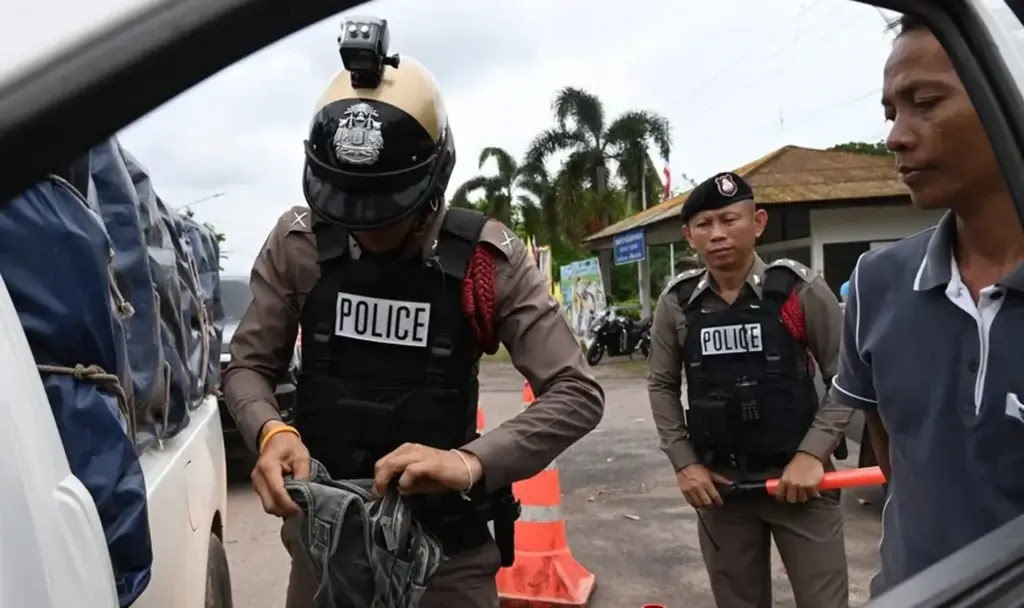News
Police Misconduct and Corruption in Thailand Eroding Public Trust

A string of recent scandals involving police misconduct have eroded public trust in the Royal Thai Police and increased pressure for long-overdue reform. Citizens are applauding whistleblowers who recently exposed alleged police misconduct, landing police officers in hot water.
A Pattaya police officer has been suspended pending a disciplinary investigation after allegedly demanding 60,000 baht from a tourist for possession of an e-cigarette.
Following a Channel 3 program on Jan 31, Pol Sen Sgt Maj Noppakrit Pornwatanathanakij, a traffic officer at Pattaya station, was initially transferred to an inactive post at the Provincial Police Office on Feb 1.
According to the report, a Chinese tour guide sent a message to the other guides in his group warning them that a visitor he was looking after had been detained for having a vaping device by a police officer who demanded a 60,000 baht fine. The amount was reduced to 30,000 baht after some haggling. This occurred in Pattaya near the end of January.
An investigation determined that Pol Sen Sgt Maj Noppakrit had committed a serious breach of discipline under the National Police Act. A second committee was formed to consider disciplinary action against the officer.

Six police officers from Huai Khwang station have been charged with accepting bribes in connection with the alleged extortion of a Taiwanese actress and her friends at a checkpoint on January 4.
Previously, the officers were charged with dereliction of duty for failing to make an arrest in connection with the group’s illegal possession of vaping devices.
A Singaporean man told reporters that he paid the officers at the checkpoint 27,000 baht to keep the group, which included Taiwanese actress Charlene An, from being arrested.
Chuvit Kamolvisit has also recently pointed the finger at two senior police officers who allegedly used their connections to run a gambling network with more than 10 billion baht in circulation – a network larger than the macau888 network, which has recently received a lot of media and police attention.
Another high-profile case involves Pol Col Thitisan “Joe Ferrari” Utthanaphon, who was convicted in August 2021 of the custodial killing of a drug suspect in Nakhon Sawan.
On June 8, last year, the Central Criminal Court for Corruption and Misconduct sentenced him to death but commuted it to life in prison because he confessed to some charges.
The police force is the first step in the criminal justice process because it conducts an investigation and gathers evidence in order to identify and arrest a suspect.
According to the Internet Dialogue on Law Reform (iLaw) group, the police force has come under fire for a lack of independence and a culture of position-buying among officers.

Following the 2014 coup, the National Council for Peace and Order declared police reform a top priority. The issue is part of a national reform blueprint that covers 11 reform areas, including justice reform.
On October 6, 2014, the National Reform Assembly was established, and a committee on law and justice reforms was formed.
According to iLaw, these efforts appear to have failed despite the formation of several new committees to address the issue.
The justice and police reform process had dragged on for nearly eight years before parliament passed a national police act on July 5, last year. It went into effect on October 17, last year.
The new law is intended to replace the National Police Act of 2004, and it establishes new rules governing the police force in accordance with the national reform plan. However, academics involved in the process point out that the reforms continue even after the law is passed.
The law, according to Supachai Yaowaprapas, president of the Council of the Royal Police Cadet Academy and a former drafter of the bill, focuses on personnel management, though the rules regarding appointment and promotions have yet to take effect.
Mr. Supachai also stated that the Police Commission, the National Police Policy Commission, and the committee in charge of handling complaints against misbehaving police officers are being restructured.
The complaints committee, for example, will include members from outside the police force, such as the Lawyers Council of Thailand and prosecutors. He stated that the selection process is still ongoing.

He also stated that the Police Commission will be restructured with elected members rather than appointed ones, and that timetables for action plans and related procedures have been established.
Once completed, there will be one more delay because parliament has decided to postpone the act’s enforcement for 240 days because the RTP requested more time to prepare.
“The law also establishes a system to deter police from committing crimes by ensuring their well-being. According to the law, a survey will be conducted to ask people how satisfied they are with the police force, and the results will be used to determine promotions,” Mr Supachai said.
However, Vicha Mahakhun, a former national anti-corruption commissioner, described police reform efforts as an uphill battle that requires a lot of effort and determination.
“It is a nearly impossible task because the police force’s decision-makers do not want reform because it entails getting rid of old things and introducing new ones.

“It is impossible to reform the police while the force is overseen by the prime minister,” Mr Vicha said, referring to the Police Commission and the National Police Policy Commission, both of which are chaired by the prime minister as required by law.
“”Reform must be initiated and carried out by individuals with an independent mindset who connect with people rather than becoming their boss,” Mr Vicha stated.
“Public input must be considered in reform. It should not come from those at the top dictating the rules. They used to rely on patronage and now ignore the people,” Mr Vicha said.
“If police value people, they will not set up checkpoints and extort money from them before sending it to their superiors. “It’s a patronage system in which subordinates find money and give it to superiors in exchange for positions,” he explained.
“The national police law is part of efforts to reform the force, though such an entrenched hierarchical structure will be difficult to shake,” he said. Mr Vicha also believes that social media can be used to investigate and expose police misconduct.
Senator Seree Suwanpanont agreed, saying that some cops buy their way into high-ranking positions and then order their subordinates to extort money.
“Reform appears to have stalled because no serious effort is being made to address these issues,” Mr Seree said.
Although the new law tightens police scrutiny, it remains to be seen whether it can prevent position-buying and extortion, he said.

Mana Nimitmongkol, secretary-general of Thailand’s Anti-Corruption Organization, also identified position-buying among police officers and attempts to curry favour with their superiors as major issues that must be addressed.
“No one [in the police force] wants to solve the problem because they take turns holding those positions and are happy with it,” he said.
“Police reform is still a pipe dream. Some may be looking forward to it, but many do not believe it will happen.
“Any politician who promises reform as part of their election campaign must be more specific about the areas in which they want to make changes.
“Instead of increasing the number of police-general positions or welfare benefits, they should promise to find ways to scrutinize the force and ensure its independence,” Mr Mana said.
The Huai Khwang extortion case, according to Pol Lt Col Krisanaphong Poothakool, assistant to the Rangsit University president and chairman of the university’s Faculty of Criminology and Justice Administration, serves as a lesson that the RTP must make a serious effort to combat corruption among officers.
Even though mechanisms for scrutinizing police work are already in place, he claims they are not fully enforced. Pol Lt Col Krisanaphong proposed that the chain of command be simplified and that the public be given a larger role in scrutinizing the force.
He added that police should seek public support to help keep officers in check, as in the case of Mr Chuvit acting as a whistleblower.
The RTP should educate the public about the impact of corruption and the importance of preventing it, while people should understand that bribing officials is a serious crime with serious consequences, he said, adding that it is critical for police to enforce the law without fear or favour.
Top Cyber Crime Police Officers Linked to Macau888 Gambling Network
Top Cyber Crime Police Officers Linked to Macau888 Gambling Network






























